|

Taking
it All in Stride
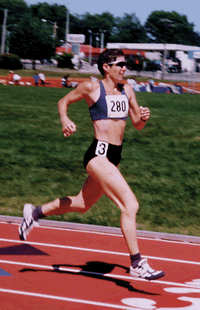 Martha Rosett Lutz
Martha Rosett Lutz |
Martha
Victoria Rosett Lutz (PhD '02) is part of the running
team who set the world record for the Masters indoor 4 x 400
meter relay for women ages 40-49 with the official time of
5:01:96. Lutz ran the third leg of the relay (at the time
as a science education graduate student) at the Westwood Sports
Center in Sterling, Ill., in February 2002.
But
sprinting isn't everything to Lutz. She also has a passion
for bugs, her family, and teaching. Currently, she is following
her life-long dream and has enrolled as a graduate student
in entomology at the University of Kentucky. She is also working
as an adjunct professor in the biology department at Lexington
Community College-"putting her education degree to good use,"
she says. She teaches human ecology and a biology lab course
to about 90 students.
For
Lutz, her educational path has not been a sprint, but a long
road where she has made great strides through life with patience
and grace.
After
receiving her Ph.D. in Science Education, Lutz asked her husband
to keep his side of the bargain they made 25 years ago.
"In
1979, I was a graduate student in entomology at the University
of Kansas when my husband asked me to marry him," Lutz said.
"I agreed, but insisted that I wanted to be able to continue
my entomology studies. I said I was willing to leave KU, marry
him, have five children (we agreed on that in advance),and
be the primary caregiver for our children, if in exchange
he would promise that I could complete my advanced degree
and have a career in entomology."
They
married in 1980, and for the first 23 years lived in places
where there was no opportunity for her to study entomology
in a formal academic setting. She kept her side of the bargain:
She had five children, was the primary caregiver, and read
whole entomology textbooks to keep up with her field.
During
this time, she also earned a master's degree in botany while
living in St. Louis, and a doctoral degree from Iowa.
She
is making good use of her dissertation project of instructing
with insects in K-12 classrooms. Last summer she designed
a "cicada fest" at the local Children's Museum that was such
a big hit that a local first-grade teacher asked her to bring
some insects to her classroom.
"Boy,
have we gotten the mileage out of those cockroaches," a Lexington
elementary teacher Karen Raulston said. "They are really quite
sweet. They hiss when I check them first thing in the morning
and then they are pretty mellow after that. We can't thank
you enough for the wonderful program and the charming cockroaches.
One student told his mother he wanted to be an entomologist
now instead of an astronaut."
In
addition to teaching and grad school, Lutz is still running,
and in August took gold for the 4 x 400 at the National Masters
Championships in Decatur, Illinois. She also placed fourth
in both the 200 and 400 meter races for her age division.
And
so, the stride continues.

Lambert
Recognized as Exemplary Teacher
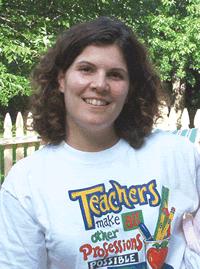 Dorothy Lambert
Dorothy Lambert |
Only
four years after earning her bachelor's degree in elementary
education at The University of Iowa, Dorothy (Keller) Lambert
(BA '96) had already been identified as an "exemplary teacher"
in her Kansas City, Kansas, school district.
In 2001, Lambert was selected as one of three
teachers at William Allen White Elementary School and one
of approximately 50 teachers in her district to participate
in a district-wide effort to improve literacy.
"It was an opportunity for other teachers to
come into my classroom and observe me teaching and see ways
they could develop their own literacy skills," Lambert said.
Lambert, who taught second grade at an inner-city
school, participated in the Exemplary Teacher Program for
both of the two years the program was funded by a grant.
"I modeled a strategy involving effective read-alouds,"
she said. "Its purpose was to increase active participation
during reading. The focus was on having the students make
predictions prior to having a story read to them, increasing
their vocabulary, and to encourage them to use their prior
knowledge of personal experiences to infer how a story might
end or why the characters in the story behaved in a certain
way."
Lambert also served as a mentor to new teachers
in the district.
"I would go into a first year teacher's classroom
and observe and then we'd sit down and plan long-term goals,
and talk about difficult areas," Lambert said.
Lambert is currently on leave from full-time
teaching to take care of her one-year-old daughter, Paige.
She still works as a regular substitute teacher at her former
school. -by Heather McElvain

Transition
Program Successfully Teaches Life Skills

Chalupsky's Kennedy High School recycling team |
Patricia
Chalupsky (BA '97/MA '03) is currently coordinating and
teaching at a new transition program in the Linn-Mar (Marion,
Iowa) school district called "Project Success." The new program
is designed for post-high school students with mild to moderate
mental disabilities and/or autism through the age of 21.
The program's primary goal is to increase the
student's independent functioning through an instructional
curriculum organized into four domains: Domestic, Community,
Vocational, and Recreational-Leisure. Chalupsky teaches through
meaningful, integrated routines in the daily lives of her
students.
"The curriculum is based on the philosophy that
motor, social, and communication skills will be most meaningful
and most efficiently learned if they are taught within the
context of the daily functional activities in which they are
used," Chalupsky said. "Thus, we teach these skills embedding
them into activities which are taught within functional daily
routines."
Chalupsky and her staff focus on the development
of domestic skills such as food preparation, personal care,
and housekeeping. They also focus on the student's community
needs and vocational experiences. Training at community vocational
sites is a regular part of these experiences. Community work
sites serve as training environments to develop and reinforce
work skills, attitude and behaviors, and provide evaluation
information pertinent to future vocational planning.
"We try to increase the repertoire of activities
that the student can perform independently in home, community,
and vocational environments," she said. "It is increasingly
important to provide instructional opportunities that encourage
families to support students participation in community recreation
programs and activities as part of their preparation for transition
from school to adult life."
Prior to this position, Chalupsky taught in
the autism program at Cedar Rapids' Kennedy High School where
she developed a successful school recycling program. The program
not only promoted cleanliness and environmental awareness,
but allowed her students to develop valuable job skills that
became useful in their post-graduation careers.

The
Write Stuff
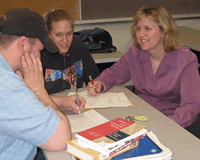 Beth Hafner
Beth Hafner |
Beth
Hafner (BA '90) has been an English/Journalism Instructor
at Clinton (Iowa) Community College for the past six years.
Hafner vividly remembers Dr. James Marshall's strong influence.
"I still recall writing numerous in-depth journal entries
in response to his assignments," she says. "I learned a lot
about myself as a student and as a learner during his classes,
and those insights have helped me as a teacher."
After Hafner graduated, she taught high school
for a year and completed a five-year stint as a social worker
in the Quad Cities. She then earned her master's degree in
English (with an emphasis in composition) from Western Illinois
University and shifted into teaching English at area community
colleges.
Currently, she works with students straight
out of high school or a GED program, students who have taken
a few years off since high school, students who juggle children
and work along with their studies, and students who are "older
than my parents," she writes.
A typical day includes teaching two to three
classes and having office time to plan lessons, grade papers,
and meet with students. Most semesters she teaches Composition
I, Composition II, Introduction to Literature, and News Writing
I & II. She also advises the college newspaper, The Gallery,
so her office is adjacent to the newspaper lab. Sometimes,
when her classes are smaller, she says she can work individually
with more students. "But when I have 25 students in a one-semester
composition class it is difficult to get to know the needs
and abilities of the students as much as I would like," she
writes. All of her classes include a mix of ages and backgrounds;
therefore, the younger students learn from the non-traditional
students and vice versa.
Hafner says she loves her job and appreciates
the opportunity to share her knowledge with others. "My students
constantly amaze me with their enthusiasm, hard work, insights,
and growth," she writes. "I thank the faculty and staff of
The University of Iowa, especially the College of Education,
for giving me the skills I needed to get started on this career
path."

Book
Combines Maybach's Past, Present, and Future
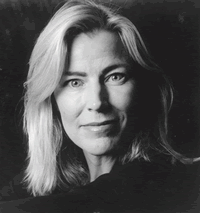 Carol W. Maybach
Carol W. Maybach |
Carol
Wiechman Maybach (BA '80) has combined her past, present,
and future in her new book just out from Lyon's Press. Creating
Chefs: Recipes and Lessons from Culinary School celebrates
the lives and teachings of 28 chef educators at the Le Cordon
Bleu Culinary Program. The book combines Maybach's appreciation
of teaching from her past years at Iowa; her present loves
of cooking, writing, and photography; and writes for future
generations of culinary students as teachers as they strive
to get the most out of their education and life's work.
"...Passion is everywhere in this book," writes
Michael Ruhlman, author of The Making of a Chef. "Not only
described by chef instructors featured here, but by the camera
and pen of Carol Maybach, herself, a talented writer, photographer,
and now, surely, cook."
Maybach is currently a writer for 5280 Denver's
Mile-High Magazine.
Citrus Sour Cream Rose Cake
(Serves 8)
Ingredients
16 ounces (3 ½ cups + 1 tablespoon) Cake Flour
½ teaspoon Salt
¼ teaspoon Baking Soda
16 ounces (2 cups + 4 ½ tablespoons) Superfine Sugar
8 ounces (1 cup) Butter, unsalted, room temperature
1 teaspoon Vanilla
6 Eggs, large, room temperature
2 tablespoons Orange Zest
1 cup Sour Cream, room temperature
¼ cup Orange Juice, naval, freshly squeezed
1 ½ cups Dried Cranberries, optional
 Procedure Procedure
1. Preheat the oven to 325 degrees F.
2. Prepare a heavy 10-inch rose shaped bundt pan by spraying
it with vegetable non-stick spray, then dusting it with flour.
Be firm when tapping out the excess flour: in a bundt pan,
there are many different places where flour can get trapped.
3. Sift together the flour, salt, and soda. Set aside.
4. In a mixer, cream together the sugar, butter, and vanilla
until it is light and fluffy.
5. With the mixer on low, add the eggs 1 at a time, waiting
for each egg to become incorporated before adding another
egg to the bowl. Turn off the mixer, stop and scrape the bowl
well.
6. In a small bowl, mix the orange zest, sour cream, and orange
juice together.
7. Put the mixing bowl back on the mixer and add a quarter
of the dry ingredients. Start the mixer on low so that the
ingredients do not fly out of the bowl. When the ingredients
are just incorporated, add a third of the sour cream/orange
mixture and mix until incorporated. Alternate adding the wet
and dry ingredients in this pattern until all of the ingredients
are just combined. During the last addition of the dry ingredients,
add the dried cranberries if you are using them.
8. Pour the batter into the pan and bake for approximately
80 minutes, until the cake is golden brown and a long wooden
skewer comes out clean when it is inserted halfway between
the edge of the pan and the center hole.
9. Remove the cake immediately from the pan and cool on a
wire rack. Finish with a dusting of powdered sugar or drizzle
with your favorite glaze.
Copyright 2003 Carol W. Maybach

Celebrating
Earth Day
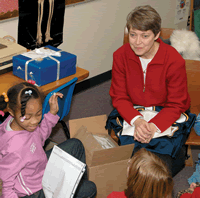 Julie Busch
Julie Busch |
As
part of their Earth Day celebration each year, the 300 students
at Iowa City's Mark Twain Elementary School plant a garden
full of salad greens, carrots, radishes, and onion sets. Every
child carefully places seeds in the 200-square-foot plot whose
produce is harvested each fall. One year, the garden provided
over 700 pounds of vegetables for a local social service organization,
Table to Table. Last year, the children harvested sorghum
as part of a unit on medieval study. Later, they will pop
popcorn they planted this spring.
Third-grade teacher Julie Busch (BA '69/MA
'74) says that the process of creating the garden plants the
seeds of appreciation for the natural world in Twain students.
"It takes a little practice," Busch says, "but
the students catch on quickly. Each class has it's own plot
and the kids love watching everything grow. Some even come
back to school to visit the garden during the summer."
"It's kind of good making food for someone else,"
says one young man in Busch's class. "It's fun to plant the
garden, but even nicer to share."
For the past several years, the Twain science
committee, teachers, and administrators have organized the
school's month-long Earth Day celebrations. This year, in
addition to sowing seeds, students also are making 76 concrete
stepping-stones embedded with stones, feathers, beads, and
other objects they have found in nature or brought from home.
Once they have hardened, the steppingstones will be placed
around the school.
"The children enjoy working with the wet cement,"
says art teacher Cerina Wade (MA '94/MFA and teaching
certificate '95) as a team of three girls presses purple hyacinths
into their 18-inch disk. "And they're proud to contribute
something permanent to the school."
The event also draws on the talents of a number
of parent and community volunteers, including Brad Freidhof,
a naturalist from F. W. Kent Park and a couple dozen University
of Iowa science education students. The UI students design
and present hands-on lessons related to the Earth Day theme.
Throughout the sunny spring Earth Day, the young
horticulturists continue to plant their garden. They are intrigued
with the seeds ("Whoa-these are huge!"), the end product ("Our
sunflowers are big-big as you!"), and the garden fauna ("If
we don't pay attention, the grubs will eat our salad."). And,
of course, there's always the lowly earthworm.
"We like 'em," one boy says, "because we can
use them to freak out the girls." -by Jean Florman

 Amy Nissley
Amy Nissley |
 Amy
Nissley (BA '00) received a master's of art degree in
Christian Formation from the Associated Mennonite Biblical
Seminary in Elkhart, Ind. Amy
Nissley (BA '00) received a master's of art degree in
Christian Formation from the Associated Mennonite Biblical
Seminary in Elkhart, Ind.
Bettina
Fabos (PhD '02) is an assistant professor of electronic
media in the Department of Communication Studies at the University
of Northern Iowa.
Teachers
College Press published her book, Wrong Turn on the Information
Superhighway-Education and the Commercialization of the Internet,
in 2004.
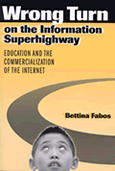 In the book, Fabos investigates the multibillion-dollar
project, the "Educational Challenge," which aims to link every
U.S. classroom to the information superhighway, exposing the
advertising campaigns and corporate maneuvers that lured schools
online; explores how educators use the Web in their classrooms,
providing advice to help students and teachers look more critically
at information provided by commercial search engines and sites;
and identifies solutions, such as noncommercial subject directories
and the emerging digital archiving movement, as the best hope
for
educators to take back the Internet from commercial control. In the book, Fabos investigates the multibillion-dollar
project, the "Educational Challenge," which aims to link every
U.S. classroom to the information superhighway, exposing the
advertising campaigns and corporate maneuvers that lured schools
online; explores how educators use the Web in their classrooms,
providing advice to help students and teachers look more critically
at information provided by commercial search engines and sites;
and identifies solutions, such as noncommercial subject directories
and the emerging digital archiving movement, as the best hope
for
educators to take back the Internet from commercial control.
UI
Associate Professor Cynthia Lewis writes, "[the book]
sets the standard for books about the Internet and education.
This provocative, timely volume offers sound arguments and
bold solutions about the dilemmas educators face as the Internet
becomes increasingly privatized. It is essential reading for
educators, policymakers, researchers, and the general public
as they develop critical frameworks for understanding the
role of the Internet in teaching and learning."
Yunghung
Sandra Hsiao (MAT '02) teaches Chinese at Indian Trail
Academy in Kenosha, Wis.
 Cathy
(Haines) Moore (MA '90) has taken a position as a trainer/facilitator/content
developer at the home office for Wal-Mart after working 20
years with the Cedar Rapids (Iowa) Community School District.
In the Wal-Mart management position, Moore teaches soft skill
classes to 16,000 home office personnel.
Cathy
(Haines) Moore (MA '90) has taken a position as a trainer/facilitator/content
developer at the home office for Wal-Mart after working 20
years with the Cedar Rapids (Iowa) Community School District.
In the Wal-Mart management position, Moore teaches soft skill
classes to 16,000 home office personnel.
Andrew
Simcox (PhD '91) is currently a psychologist at the Federal
Medical Center in Rochester, Minn. A recent case involved
Simcox testifying before a U.S. magistrate that Lucas Helder,
the man accused in a Midwestern mailbox bombing spree who
selected the targets to form a smiley face pattern, suffers
from delusions. Simcox said medical-health professionals on
both sides of the case agree that Helder has schizo-affective
disorder.
Terry
Sherer (MA '90/PhD '93) serves as principal at North Scott
High School in Eldridge, Iowa. He received the first William
F. Tubbs Honor Rotarian Award in June. The award, named after
North Scott Press publisher, Bill Tubbs, was unanimously presented
to Sherer, a new member.
"Terry is passionate about young people and seeing them achieve
at the highest levels," said Scott Case who presented Sherer
with the award. "His vision for Rotary is both local and global.
He is involved with Rotary Youth Exchange, youth at our meetings,
and volunteers at the Special Olympics."
Kathleen
A. Stierman (BFA '90) teaches K-8 art for the East Dubuque
School District #119. In conjunction with this summer's Grand
Excursion 2004-the largest riverboat and steamboat flotilla
on the Mississippi River in over a century-Stierman came up
with the idea to get her students to try to break the Guinness
World Record for the world's largest canoe float. Although
they did not make the record of 776, 331 canoes participated
on the back waters of the Great Mississippi River, and over
1,000 people joined the float group to enjoy the day, coming
from as far away as Florida, New York, and Pennsylvania.
"Our
oldest canoeist was 83 and our youngest was three," Stierman
said. "The highlight of the float was when the paddlers started
the wave-nothing was a greater sight to see over 600 paddles
waving in the air."
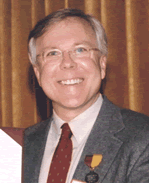 William F. McComas
William F. McComas |
William
F. McComas (PhD '91) is an associate professor of science
education at the Rossier School of Education at the University
of Southern California in Los Angeles. He is the founding
director of the Program to Advance Science Education (PASE),
home to USC's academic science education initiatives. McComas
was recently selected recipient of USC's '04 Associates Award
for Excellence in Teaching, the university faculty's highest
honor bestowed on its members. The award recognizes career
achievements in teaching with emphasis on concrete accomplishments
and proven results.
In
making the selection for the award, USC recognized McComas
for "the breadth and scope of both his teaching and his research.
He is an acknowledged expert in various aspects of instruction,
including laboratory teaching. Learning in non-school environments,
and, most particularly, in the impact of the history and philosophy
of science on science teaching."
McComas'
research focuses on biology and evolution education, the philosophy
of science in science teaching, the elements of effective
laboratory, and informal science learning in museums and field
settings. His most recent book is The Nature of Science
in Science Education: Rationales and Strategies.
For
the past decade, McComas has developed and hosted tours to
ecologically significant areas worldwide including Indonesia,
Malaysia, East Africa, the Galįpagos Islands, Iceland, Greenland,
and the Faroe Islands. Last summer he led a trip to Bolivia
and Peru.
His
professional interest in photography has resulted in development
of photo based instructional and resource units, a major exhibition,
"The Galįpagos Islands: Evolution's Showcase," at the Los
Angeles County Museum of Natural History and several photo
assignments to ecology research sites in Central America,
New England, and Colorado. Over 30 of his photographs have
appeared on the covers of journals such as the American
Biology Teacher, the Journal of College Science Teaching
and Science Scope.
Other
recent honors McComas has received include the Outstanding
Science Teacher Educator Award from the Association for the
Education of Teachers in Science in 1997, the Distinguished
Achievement Award from the 1998 Educational Press Association
for his article, "The Discovery and Nature of Evolution by
Natural Selection: Misconceptions and Lessons Learned," the
Socrates Award from the Graduate Students of the Rossier School
of Education in 2001, and the NSTA-Ohaus Award for Innovations
in College Science Teaching in 2001. He is also a fellow of
the USC Center for Excellence in Teaching.
Martha
Ward Cassidy (MA '93) was named principal at Wanamaker
Elementary School in Topeka, Kan. Prior to this position,
Cassidy served as assistant principal at Scott Technology
Magnet Schools. This is her ninth year in the Topeka Public
Schools.
Vyjanthimala
Balakrishna (MA '93) is serving as principal at Bukit
Panjang Primary School in Singapore with a student population
of 2,700. Currently, she is exploring a school-within-a-school
concept for organizational development and moving into an
integrated learning curriculum. The schoolchildren excel in
performing arts, Balakrishna believes, because of collaborative
efforts with the students' parents.
 Ann Pare Ehler
Ann Pare Ehler |
Ann
Pare Ehler (BS '97) earned the Teacher of Year honor at
Manatee Elementary School in Viera, Fla. She attended the
UI on a full scholarship playing field hockey while pursuing
her teaching career. Ehler earned her master's degree in educational
leadership/school administration from Nova Southeastern University,
graduating with a 4.0, along with achieving her National Board
Teaching Certification. She is in her seventh year of teaching
in Brevard County, Fla.
Robin
Lee Harris (PhD '97) received tenure and was promoted
to associate professor last fall at Buffalo State College
in Buffalo, N.Y. Her urban science professional development
project titled, "Buffalo Science Teachers Network," was renewed
for four more years, where she continues work with area middle
school science teachers.

 Brian Knutson (PhD
'82) is superintendent of schools for Lake Zurich Community
Unit District 95 in Lake Zurich, Ill. Lake Zurich serves approximately
7600 students in nine schools (K-12). Prior to this position,
Knutson served as superintendent of Rich Township High School
District 227 in Olympia Fields, Ill. for nine years.
Brian Knutson (PhD
'82) is superintendent of schools for Lake Zurich Community
Unit District 95 in Lake Zurich, Ill. Lake Zurich serves approximately
7600 students in nine schools (K-12). Prior to this position,
Knutson served as superintendent of Rich Township High School
District 227 in Olympia Fields, Ill. for nine years.
Mary
Janecek-Friedman (BA '83) currently teaches fourth grade
at Cypress Elementary School in Cedar Park, Texas. Previously,
she taught fifth grade for 15 years also in the Leander Independent
School District. Her website is http://classroom.leandersisd.org/webs/mary.friedman.
With her specialization in bilingual English, Texas was a
natural place to begin her teaching career. After graduation
she taught in a bilingual classroom for two years in Houston,
followed by a move to Austin, where she continued her education
and received a master's degree from the University of Texas.
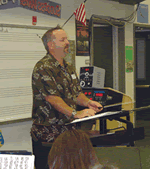 David Stone
David Stone |
David
Stone (BM '85), has been helping set the musical tone
in the Carroll Independent School District of Southlake, Texas,
for 17 years. This year, he was named the district's Teacher
of the Year. Stone's unique style of teaching challenges his
students while at the same time making music fun. The
beginning low brass section he teaches at Eubanks Intermediate
School is tackling music from Pirates of the Caribbean.
He has been known to kill the lights during a concert so drummers'
neon stick work could be highlighted. He peppers his sentences
with words such as "dig" and "stoked."
"He
not only picks great music, he pushes us to play our very
best," said Jake Jackson, 14, an eighth-grade student at Dawson
Middle School, where Stone is the head band director. "He's
awesome."
In
his time in the district, Stone took a middle school program
with 65 students and grew it to more than 300. Stone said
that although he takes his responsibility at the middle school
seriously; he's out to develop lifelong music lovers - not
professional musicians.
"I
used to look at it as, 'I've got to get these kids ready for
high school,' " he said. "But now I strive to build a love
and appreciation for music. We always hope they stay with
it. We hope to get them to love music as much as we do."
A
trumpeter by trade, Stone said his goal at The University
of Iowa was to become the principal trumpet player for the
Chicago Symphony. But spending hours on end in the practice
room didn't appeal to him. So he dedicated himself to learning
as much as he could about teaching music.
When
a job opportunity brought his wife to Texas, he was thrilled
to find a job teaching in "the band state." "Band is big here
because football is big here," he said. "I knew I'd have a
good opportunity to have a great job here."
He
also spends time directing the Southlake Community Band, a
group of 85 musicians made up of professionals and students.
He said he loves teaching music because "being a musician
teaches students about language, history, science, and math
- the whole curriculum."
"Music makes you a well-rounded person," he said. "It influences
everything else you do." - by Laurie Fox © The Dallas Morning
News.

 Tom
Haight (BBA '71) just completed his 20th year teaching
business and coaching swimming at Seminole High School in
Seminole, Florida. Haight was nominated as 2004 Teacher of
the Year and last year his girls swim team finished fourth
in the state high school championships. Tom
Haight (BBA '71) just completed his 20th year teaching
business and coaching swimming at Seminole High School in
Seminole, Florida. Haight was nominated as 2004 Teacher of
the Year and last year his girls swim team finished fourth
in the state high school championships.
Loleta Hall (BA '71/MA '74) is currently the Elementary
curriculum coordinator for the Waterloo Community School District
in Iowa. The Iowa FINE (First in the Nation in Education)
Foundation awarded the innovative program she developed, "Waterloo
Building Blocks for Reading Excellence," with a 2004 recognition
award.
"We set out to develop a 'Cadillac' literacy program for
a district that was used to a jalopy," Hall said. The resulting
program provides in-depth professional development, more time
for reading instruction, direct instruction in phonics and
reading strategies, half-time reading coaches in each elementary
building, and changes in the way student performance is assessed.
The program's solid results are shown by an increased reading
proficiency of fourth grade students, increased percentages
of students reading on grade level (grades 2-5), and increased
participation rates.
Lowell Brandt (BA '72/MA '79) was appointed warden
at the Iowa Medical and Classification Center in June. Brandt
didn't start out knowing where his career path would take
him.
"I went to college wanting to get into education," he said,
recalling his education started in a one-room school in Postville,
Iowa. "I was really interested in teaching and wanting to
have an influence on people's lives."
Unable at first to find teaching employment, Brandt accepted
a corrections officer job at the prison, became interested
in the population, and pursued a graduate degree in rehabilitation
counseling. As one thing often leads to another, ascended
from treatment director to deputy director in charge of offender
services with the Iowa Department of Corrections.
"The challenge to me was to see if there wasn't something
we could do to have an impact," Brandt said. "We're teaching
new ways of thinking, new ways of behaving."
Brandt has placed a priority on going inside the prison and
meeting with offenders and some of the 200 or so employees
on each of the three shifts.
"This job will probably bring me back to a little more hands-on,"
he said of the warden position.
Iowa City Press Citizen © June 2004
Melissa Farley (PhD '73) recently edited the book,
Prostitution, Trafficking, and Traumatic Stress, by
Haworth Press, 2003. Among the many positive reviews, American
Psychological Association President-Elect Ronald F. Levant
writes, "A must-read for anyone interested in human rights,
women's issues, and the psychology of exploitation.A groundbreaking,
eye-opening, landmark book that will forever change the way
we view prostitution. Farley has assembled a dream team of
contributors, including psychologists, psychiatrists, lawyers,
and advocates and shatters the myth that prostitution is harmless."
Other recent publications include the following book chapters:
"Prostitution and Trafficking in Nine Countries: An Update
on Violence and Posttraumatic Stress Disorder" and "Prostitution
and Trafficking of Women and Children from Mexico to the United
States" in Understanding Prostitution and Trafficking as
Organized Interpersonal Violence; "Dissociation Among
Women in Prostitution" in Healing from Prostitution and
Trafficking.
Ellen Greenman (BS '74) is currently a middle school
math teacher at Webster Middle School in Waukegan, Ill. In
May 2004, she received her Master of Arts degree in educational
leadership from the University of Illinois at Springfield.
Tom Owen (MS '74) is a chemical engineer in Gillette,
Wyo. He is presently involved in treating coal bed methane
water with sulfur burners and therapeutic riding using horses
for enhancing physical and mental well being for adult mentally
and physically challenged individuals.
Isaac White, Jr. (BBA '74) was appointed principal
at Hamilton High School in Memphis, Tenn., where he will serve
as the school's fifth principal. White earned his M.Ed. from
the University of Memphis in 1985.
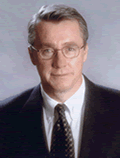
David Bell
|
David
Bell (BA '76/JD '81) is currently president of David Bell
and Associates, PLLC. His career has included working as a
trial attorney focusing on insurance, personal injury, and
commercial litigation since moving to Arizona in 1981. He
continues to teach at continuing legal education programs
on insurance law and trial practice.
More recently, he joined the adjunct faculty at the Thunderbird
School of International management to teach a course on comparative
law (U.S. - South Korea) for an annual program for a group
of S. Korean executives.

Mary Craik (PhD '68), professor emeritus at the University
of Louisville, has returned to her childhood passion of working
with fabrics. The Lexington Art League awarded her fiber art
wall hanging, "Bottom of the Sea," best of show in its current
Expressions of a Lifetime exhibit. At 80, she was the oldest
artist exhibiting. Her work of nearly 300 fiber art quilts
is sold in five galleries.
Craik's feminist ideology continues to come through in her
fiber art. "I tried very hard to change the world for women,
and a number of pieces will have the same feminist ideas,"
she says on her Web site. A couple examples are "Men Make
Money, Women Make Sense," a fiber image of a man and a woman
on a balancing scale, and "Breaking the Glass Ceiling," which
features a woman breaking through a clear vinyl cracked likeness
of a glass ceiling. For more information visit www.marycraik.com.
Susan Niendorf (BA '68) recently was named director
of academic affairs for Glenwood School in Glenwood, Indiana.
Niendorf received a master's degree in school administration
from Chicago State University and a doctorate of education
in leadership and policy from Loyola University.
"I joined the Glenwood staff because the mission of the school
mirrors the mission that I have in education," Niendorf said.
"I joined education 25 years ago to teach, to bring to children
not only the basic skills they need to be productive citizens
but to develop an enthusiasm for lifelong learning."
Niendorf leaves her position at School District 194 in Steger,
where she served as director, overseeing special education,
at-risk programs, and nursing. She has also worked as a facilitator
in the Tinley Park system and a program supervisor with the
Special Education District of Lake County, Ill.
Glenwood School, formerly Glenwood School for Boys founded
in 1887, is a nonprofit organization focused on improving
the lives of disadvantaged children throughout the Chicago
region. It serves at-risk children using a program based on
parental partnership and prevention. Glenwood partners with
low-income, single-parent families undergoing family or community-related
crisis to help children reach their full potential. The school
now serves 276 children from 60 Chicago area and Northwest
Indiana communities through two campuses in Glenwood and St.
Charles. From nwitimes.com
James Middleton (BA '69/MA '76/EdS '76) was selected
president of the Central Oregon Community College (COCC) in
Bend, Ore. Middleton will be only the fourth president in
the college's 55-year history.
"There are few-if any-colleges anywhere in the country that
has such an outstanding record of selecting and retaining
more competent and capable leaders," said Connie Lee, vice
chair of the COCC board of directors.
Prior to this position, Middleton served as a visiting scholar
at the Community College Leadership Development Initiatives
at Claremont Graduate University, 30 miles east of downtown
Los Angeles. He was president of the College of Marin in Northern
California from 1993 to 2003.
Before that time, Middleton held several administrative positions
at the Pennsylvania College of Technology, formerly the Williamsport
Area Community College.

 Robert
D. Brown (MA '56/PhD '66) is currently the Carl A. Happold
Distinguished Professor Emeritus at the University of Nebraska-Lincoln,
where he received the Chancellor's Award for Outstanding Contribution
to the Gay, Lesbian, Bisexual, and Transgender (GLBT) Campus
Community in March, 2004. Robert
D. Brown (MA '56/PhD '66) is currently the Carl A. Happold
Distinguished Professor Emeritus at the University of Nebraska-Lincoln,
where he received the Chancellor's Award for Outstanding Contribution
to the Gay, Lesbian, Bisexual, and Transgender (GLBT) Campus
Community in March, 2004.
In
2002, Brown with help from three graduate students completed
a comprehensive campus climate study to assess the needs of
GLBT students on campus and determine ways to improve the
campus climate for their learning and development.
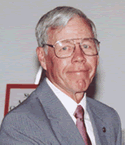
Robert D. Brown
|
The
report has been used extensively to document the nature of
the climate and inform decisions. Subsequently, a portion
of the data has been published in the Journal of College Student
Development, Vol 45 (1), 8-25, 2004.
Most
recently, Brown was elected Fellow status in the American
Psychological Association Division 44-Society for the Psychological
Study of Lesbian, Gay, and Bisexual Issues, a distinction
is given to those who have significantly contributed to the
field's research literature.
Ronald
W. Roskens (PhD '58) received one of The University of
Iowa Alumni Association's six 2004 Distinguished Alumni Awards.
Roskens, who enjoyed his boyhood on an Iowa farm, went on
to excel in the global arenas of higher education and international
relations. He was recognized for the impact of his career,
which includes the presidency of the University of Nebraska
and administrator of the U.S. Agency for International Development.
He says he used his Iowa background and his experiences at
the University of Iowa for the benefit of his community, his
state, his nation, and the world.


Conrad
R. Wurtz (BA '48/MA '50) retired from private practice
in clinical psychology from his offices in Auburn and Brunswick,
Maine, in September. Wurtz received a Ph.D. from the University
of Minnesota in 1956. He began his private practice in 1975
after a varied career as school psychologist in Cedar Rapids,
Iowa, director of special education in Rochester, Minn., psychology
professor at Omaha University and the University of New Brunswick
Medical School, director of mental retardation for the state
of Iowa, and superintendent at Pineland Center in Pownal,
Maine. His career has included service to children of all
levels of ability and their families, and individual adults.

|